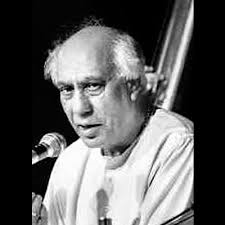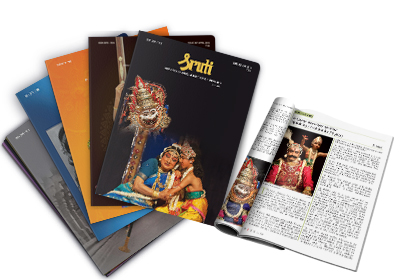
Zia Fariduddin Dagar (1932-2013)
Eminent Dhrupad exponent Ustad Zia Fariduddin Dagar passed away yesterday, 8 May. A member of the revered Dagar family of Dhrupad musicians, he taught at the Dhrupad Kendra, Bhopal, along with his elder brother, Ustad Zia Mohiuddin Dagar for 25 years.
He spoke to Sruti correspondent Shuchita Rao last year. Excerpts from the conversation:
Tell us about your childhood and your introduction to Dhrupad music.
I spent my childhood playing with friends and cousins. I was a very naughty child, quite a shaitaan! My father Ustad Ziauddin Khansahib, the court musician of Maharana Bhupal Singh of Udaipur, initiated me and my older brother Mohiuddin into learning Dhrupads. He would make us sit together, tune the tambura carefully and ask us to sound the base kharaj note “Sa”. Then he would make us sing the basic scale Sa Re Ga Ma Pa Dha Ni Sa sl-ow-ly for 30 minutes. He would ask us to think consciously while sounding out the notes. Then he would announce the lesson was over and ask us to go out and play. The next day, he would ask us to recall the Sa note sung in the previous day’s lesson. Over time, he systematically built in us a keen awareness for sruti and swar and taught us to feel the notes when we sang them.
You are a representative of the 19th generation of the Dagar family that has preserved and transmitted Dhrupad. What role did your larger family play in your development in music?
It is true that music was handed down over several generations in my family. Both my grandfathers played the sur-bahar. Ironically, our larger family did not support my brother and me in our quest to become musicians. We became artists essentially because of our parents. My father taught us music and our mother held us to high standards. She used to command us: “Go! – Do not come back and show me your faces until you have achieved something in music!”
Did you ever consider playing an instrument?
I enjoyed playing the sitar in my youth. At times, I used to spend all night playing the instrument. I was quite taiyyaar or performance-ready). But, it was my father’s wish that my older brother should play the been and that I should sing. My brother and I often gave jugalbandi performances. While vocal music is an effective tool for presenting the specific musical style of a gharana, the essence of gharana music can also be communicated through an instrument. In reality, vocal music and instrumental music give and take ideas from each other in reciprocity.
As a Muslim, how does it feel when you sing Dhrupads that praise Hindu gods and goddesses?
Music transcends religion. God belongs to everyone, whether Muslim, Hindu or Jewish. I feel the same devotion to God whether I sing about Shankar or Allah. Everyone may not understand my request to God when I sing about Him, but I can feel it inside me. It is very personal and happens in the way I apply musical notes to convey a feeling of bhakti through my music.
There is a common myth that Dhrupad singing is only suitable for males.
I believe Dhrupad singing is quite suitable for women. There is a natural difference between men’s voices and women’s voices. When it comes to heavy ornamentation such as gamak, it needs to be sung after applying adequate thought, whether it is a man who sings the Dhrupad or a woman. You cannot use it anywhere and everywhere; it is to be used only in certain places. A guru must teach the disciple how to keep the breath and musical notes under his control. He or she must tailor the teaching of gamak to the student’s individual capacity. It is the duty of a guru to listen carefully to a disciple and to guide her with care.
What challenges does Dhrupad singing present to performers?
Any art form, be it music, dance, painting or architecture, needs honest expression of bhava. You can eat the same chutney in five different homes, but you always remember the chutney that had a powerful punch in its taste. That happens because the cook put in thought and care and feeling while making the chutney. I remember watching Pandit Shambhu Maharaj present a Kathak dance performance one time. He had an enormous moustache, like a dacoit would sport on his face. He wore no makeup and no jewellery and yet, when he portrayed the role of a woman, my heart melted on the spot. An artist must immerse himself in his art form and good bhava must come across in the expression.
You have won several awards for your music. What do awards mean to you?
Awards remind me of a cow that walks about with a jingling bell around its neck. People adorn their homes with framed photographs and trophies. They carry around large bags slung over their shoulders with newspaper reviews of their performances. I am a little different – I do not need an external source to validate me. I am my own award.
You recently turned 80. Do you have any regrets at this point in your life?
I am a very contented man. I am not dying hungry. I eat dal-roti every day and have a roof on top of my head. I have good students who come to me for knowledge. That is what matters to me. My life’s desire was to discover music in its entirety. I am slowly understanding Sa Re Ga Ma now. People ask me not to go too deep – there is mud and dirt at the bottom of the ocean. I still want to go under it to discover it in entirety. For me it is it is well worth my efforts and not a waste of my time.
What is your advice to students on riyaz?
The need to do riyaz must come from a student’s heart. It is not the responsibility of the guru to make a student do riyaz. Once a student makes up his mind to study music, he must take the responsibility seriously. Vocal music students must rise early and practise singing lower octave notes in a steady manner for as long as possible in a single span of breath. Students must practise two or three ragas over and over till they master them. There are no shortcuts.
Do you think Dhrupad has a future?
I do believe that Dhrupad has a bright future. I have trained my students well. How my students preserve the tradition and carry it forward depends on them. My life turned out good; I am confident their life will be good as well.
Links - http://www.youtube.com/watch?v=gQPID3wZbiI
http://www.tehelka.com/for-ustad-fariduddin-dagar-music-was-a-form-of-sadhana/


